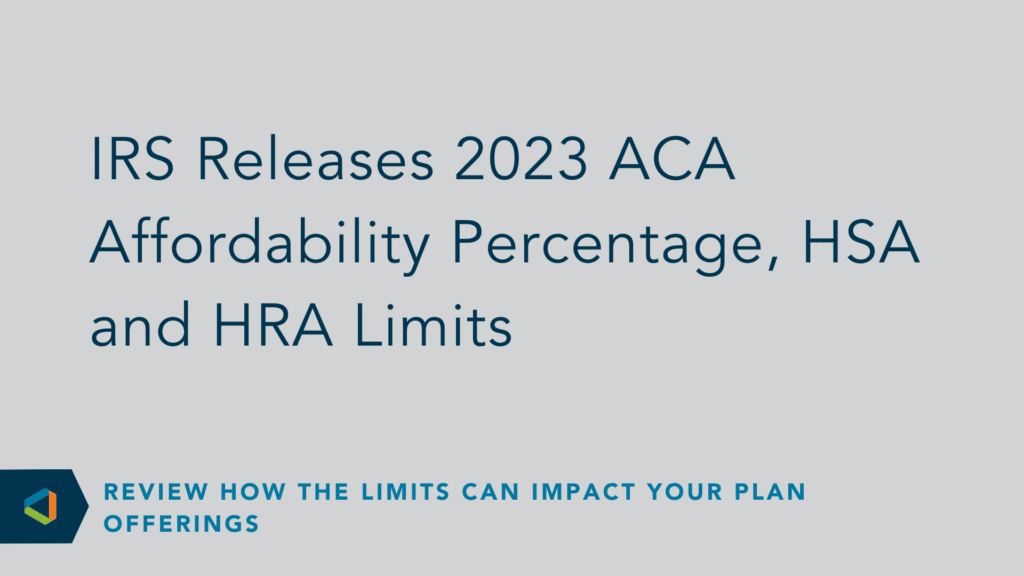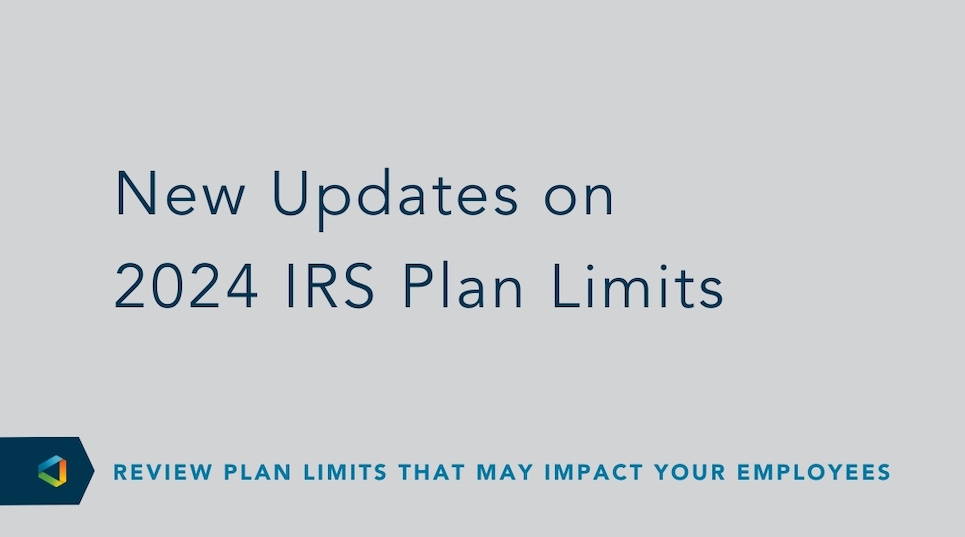Better Benefits, Compliance Confidence
2023 IRS Employee Benefit Plan Limits
2023 IRS Employee Benefit Plan Limits
The Internal Revenue Service (IRS) has released all employee benefit plan limits for the 2023 calendar year.
These limits are adjusted for inflation on an annual basis. In some cases, limits are the same as those in the calendar year 2022.
IRS Employee Benefit Plan Limits
Benefit |
2022 |
2023 |
Change |
| Health FSA Maximum | $2,850 | $3,050 | $200 Increase |
| Health FSA Maximum Carryover | $570 | $610 | $40 Increase |
| Dependent Care FSA Maximum | $5,000 | $5,000 | No Change |
| HSA Contribution—Single Enrollment | $3,650 | $3,850 | $200 Increase |
| HSA Contribution—Family Enrollment | $7,300 | $7,750 | $450 Increase |
| HSA Catch-Up Contribution (Age 55+) |
$1,000 | $1,000 | No Change |
| HDHP Minimum Deductible—Single Enrollment | $1,400 | $1,500 | $100 Increase |
| HDHP Minimum Deductible—Family Enrollment | $2,800 | $3,000 | $200 Increase |
| HDHP Maximum Out-of-Pocket—Single Enrollment | $7,050 | $7,500 | $450 Increase |
| HDHP Maximum Out-of-Pocket—Family Enrollment | $14,100 | $15,000 | $900 Increase |
| ACA Maximum Out-of-Pocket—Individual | $8,700 | $9,100 | $400 Increase |
| ACA Maximum Out-of-Pocket—Family | $17,400 | $18,200 | $800 Increase |
| Excepted Benefit HRA (EBHRA) | $1,800 | $1,950 | $150 Increase |
| Qualified Transportation—Parking (Monthly) | $280 | $300 | $20 Increase |
| Qualified Transportation—Transit (Monthly) | $280 | $300 | $20 Increase |
| Adoption Assistance Maximum | $14,890 | $15,950 | $1,060 Increase |
| 401(k), 403(b), & 457(b) Plan Maximum Elective Deferral | $20,500 | $22,500 | $2,000 Increase |
| Retirement Plan Catch-Up Contribution (Age 50+) | $6,500 | $7,500 | $1,000 Increase |
| Highly Compensated Employee—Compensation Threshold | $135,000 | $150,000 | $15,000 Increase |
| Key Employee—Officer Compensation Threshold | $200,000 | $215,000 | $15,000 Increase |
| Social Security Wage Base (6.2% Tax Rate) | $147,000 | $160,200 | $13,200 Increase |
IRS ACA Employer Shared Responsibility
Benefit |
2022 |
2023 |
Change |
| 4980H(a) Penalty for Not Offering Health Coverage | $2,750 | $2,880 | $130 Increase |
| 4980H(b) Penalty for FT EEs With Premium Tax Credit | $4,120 | $4,320 | $200 Increase |
| Affordability: Maximum Percent of Income | $9.61% | $9.12% | 49% Decrease |
| Prior Year FPL (Single Person Household) for Affordability | $12,880 | $13,590 | $710 Increase |
| Affordability: Maximum Monthly Contribution Based on FPL | $103.14 | $103.28 | $0.14 Increase |
HDHP and ACA Maximum Out of Pocket Limits
An individual’s maximum out of pocket cannot be higher than the ACA maximum for an individual, even when covered through family HDHP enrollment.
Highly Compensated Employees
The compensation threshold increases to $150,000 for prior plan year compensation. This group can be further limited to the top 20% of all eligible employees, ranked by compensation.
Key Employees
The compensation threshold for officers increases to $215,000. The compensation threshold for more-than-1%-owners remains $150,000 (not indexed). The Key Employee group also includes all 5% owners regardless of income.
4980H(a)
Annual per employee penalty for large employers who do not offer coverage to at least 95% of full-time employees. If any full-time employee enrolls in Marketplace coverage with a tax credit, penalty is charged on a monthly basis times the number of full-time employees, minus 30.
4980H(b)
Annual per employee penalty for large employers if a full-time employee is not offered affordable coverage and enrolls in Marketplace coverage with a tax credit. Penalty is charged on monthly basis only for full-time employees receiving a tax credit.
Affordability
For employer medical coverage to be considered “affordable”, the employee’s contribution for single coverage in the lowest cost plan can be no more than the ACA affordability percent of 1) Federal Poverty Level, 2) the employee’s rate of pay, or 3) the employee’s W-2 Box 1 income.
Download the 2023 Employee Benefit Plan Limits document to review contribution limit changes that may impact your company and employees. Review the latest updates employers need to know: visit the Compliance Confidence blog.
Share
Related News & Updates

Article
IRS Releases 2023 Benefit Plan Limits
10.19.2022

Article, Tools & Infographics
2024 Retirement Plan Contribution Limits
11.06.2023

Article
2023 Retirement Plan Contribution Limits
10.24.2022

